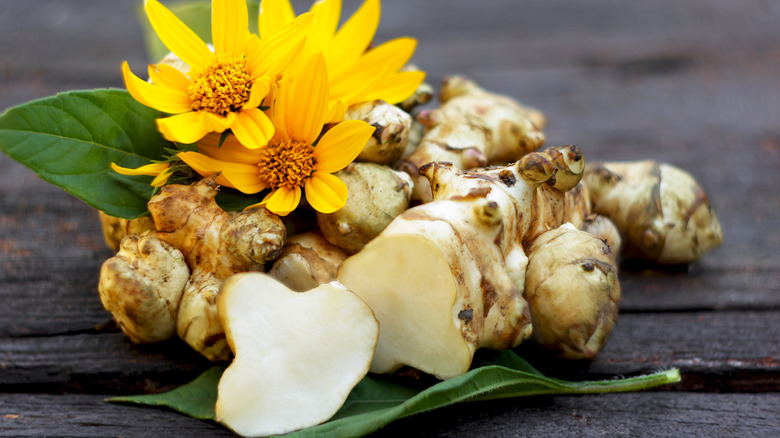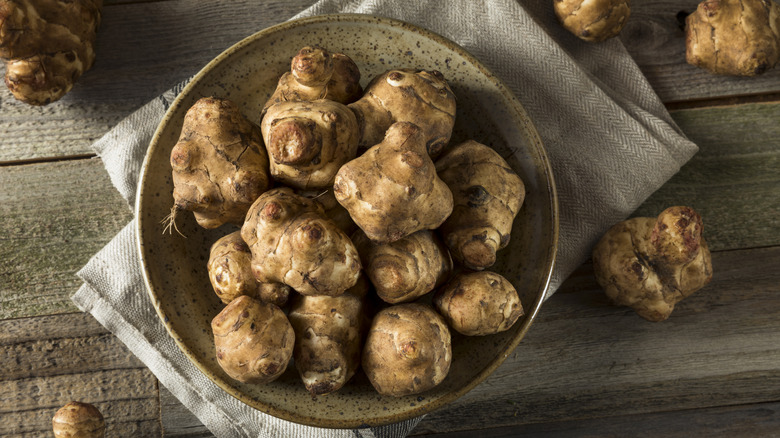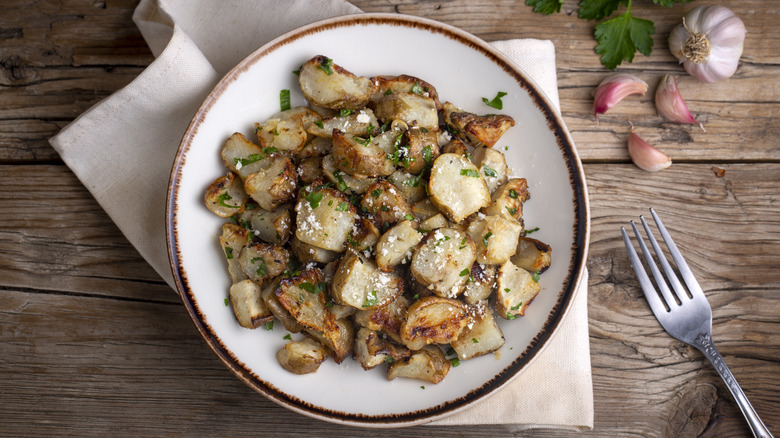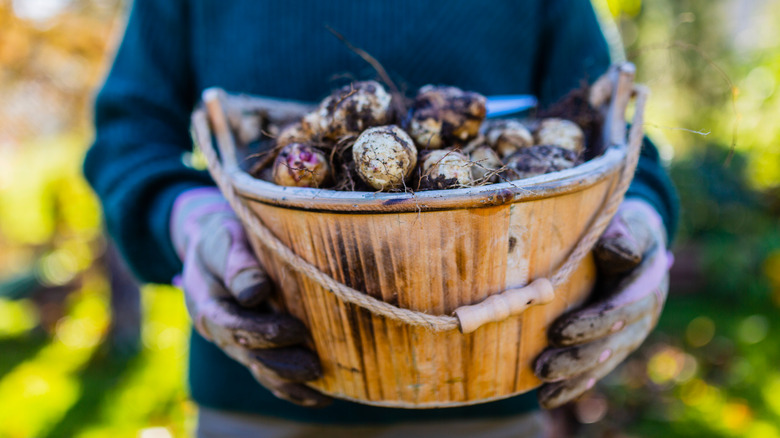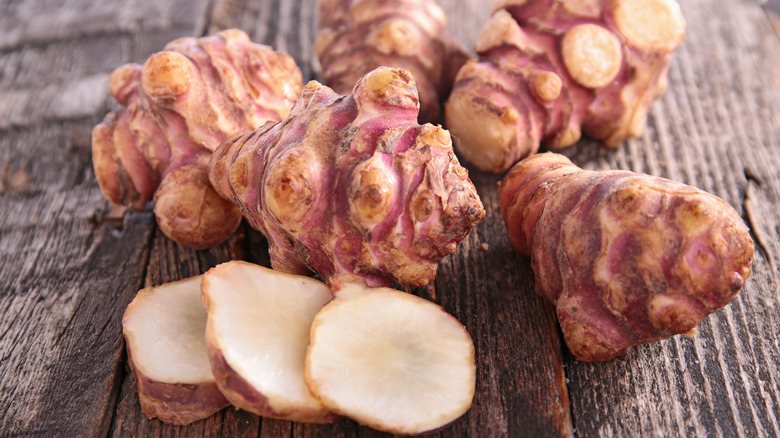Jerusalem Artichokes Are Probably Not What You Expect
If you've ever skimmed a menu and saw Jerusalem artichokes listed, you might have been surprised by what arrived on the plate. Instead of the large, sharp-ended leaves or petals of a typical artichoke, you would have gotten something that resembled more of a potato after being prepared. And a potato would be relatively closer to a Jerusalem artichoke than what you might have imagined would be associated with this type of artichoke (via Master Class). That's because Jerusalem artichokes are, in fact, tubers according to Gardener's Path.
Jerusalem artichokes (Helianthus tuberosus), also known as sunchokes, are a type of root vegetable, native to North America thanks to French settlers. They are a member of the sunflower family and are closely related to the sunflower itself. Ultimately, sunchokes are the roots of a bright yellow flower that does resemble yellow sunflowers with their black seeded centers. But what might seem like an unusual edible root to some is quite a delicacy that can be grown and prepared in many regions across the world.
This is how sunchokes are grown
Jerusalem artichokes are easy to grow and are well suited to a variety of climates. They can be planted in the spring or fall and prefer well-drained soil with a pH of 6.0 to 7.0, which is slightly acidic to neutral (via Gardener's Path). They can be grown in gardens, raised beds, or containers. They are hardy and can tolerate frost and cold temperatures, making them a great choice for fall and winter harvests. However, despite their adaptability, sunchokes experience the best and fastest growth during the late spring and summer when there isn't a risk of frost.
Sunchokes can be planted closer together, just over a foot apart, for a smaller spread of the delicious tubers according to Gardener's Path. Or, if you want to have plenty of Jerusalem artichokes to go around, then you can plant them up to five feet apart to quickly grow a large area of the crop. The one difficulty when growing this plant is that they shoot up just like sunflowers. The flowering stalks of sunchokes grow to be roughly five feet tall and can reach up to 10 feet. That means they shouldn't be planted near other full-sun crops as they will end up casting too much shade.
What do Jerusalem artichokes taste like?
In terms of taste, Jerusalem artichokes can have a couple of different flavor profiles depending on if they are raw or cooked according to Farmer Food Share. Raw sunchokes tend to have a sweet, nutty, and sometimes earthy flavor that is similar to that of chestnuts. They have a milky white flesh with a crisp texture and are great in a variety of dishes. But as delicious and refreshing as raw Jerusalem artichokes can be, they take on an entirely different flavor and texture when they have been cooked and prepared for just as many hot recipes.
According to Farmer Food Share, Jerusalem artichokes take on the qualities of two "cousin" vegetables. The texture of the sunchokes becomes softer and creamier like that of baked potatoes. But the flavor is not the same as a typical starchy, baked potato. Instead, cooked sunchokes take on a subtle flavor similar to that of artichoke hearts. But again, it comes down to one of the many ways in which they are prepared and served.
How to cook with Jerusalem artichokes
Given not only the ability to be eaten raw or cooked, but the different flavor profiles that Jerusalem artichokes can present mean that there are tons of opportunities to get creative with this ingredient. The root vegetable itself can be roasted, sautéed, or pureed among other cooking methods (via The Spruce Eats). They are a versatile vegetable that can be used in soups, stews, gratins, and salads. They are also a great addition to stir-fries, even substituting for potatoes in some dishes. That means sunchokes can also be fried, mashed, and perhaps even cooked in a sous vide.
There is, however, one downside to eating the delicious vegetable. Just as asparagus can cause urine to smell, sunchokes can also cause an unpleasant side effect as well. When it comes to cooking with Jerusalem artichokes, it's important to note that they can cause flatulence in some people (via Atlas Bio Med). This is because they contain a type of carbohydrate called inulin, which is not easily digested by the body. To reduce this effect, you can soak the artichokes in lemon juice for a few hours before cooking or consuming them (via Modern Farmer).
Where to buy them
If you are hoping to pick up a bag of sunchokes to cook and enjoy at home, then you will likely need to keep the seasons in mind. Jerusalem artichokes can typically be found at farmers' markets, specialty food stores, and some supermarkets with seasonal produce (via The Spruce Eats). While Jerusalem artichokes can be found year-round in some locations, they tend to be harvested after the first frost in the fall after growing and blooming throughout the summer.
If you are lucky enough to find Jerusalem artichokes locally, there are a few tips you might want to keep in mind while shopping for the best ones. According to Farmer Food Share, you should opt for smooth, firm sunchokes that almost resemble fresh ginger root. Don't buy tubers that are wrinkled or moldy. Once you get them home, there's no need to use Jerusalem artichokes right away. When stored properly, in a cool, dry place like the vegetable drawer in your fridge, they can hold for weeks at a time. It is, however, worth noting that sunchokes are better stored and kept unwashed to help prevent mold from growing.
Nutritional information of sunchokes
As for the nutrition of the tubers, Jerusalem artichokes are a great source of fiber, potassium, and vitamin C according to the U.S. Department of Agriculture. They are also a good source of iron, thiamin, and niacin. They are high in water content and low in calories too. Per 100 grams of raw Jerusalem artichokes, the tubers only contain 73 calories and 78 grams of water. They are also a good source of inulin, which is a type of prebiotic that can help promote the growth of beneficial bacteria in the gut. Just keep in mind that you might want to cut back on the amount of inulin to prevent too much gas.
Overall, Jerusalem artichokes are a delicious and nutritious vegetable, easy to grow, and can be used in a variety of dishes. They are a great way to add flavor and nutrition to your diet and are a great option for those looking for low-calorie, high-fiber foods. With the versatility of cooking methods and the health benefits they offer, Jerusalem artichokes are a great addition to any diet.
